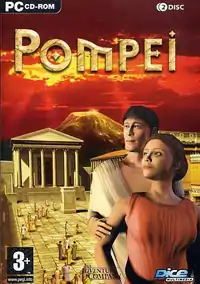Pompei: The Legend of Vesuvius
Pompei: The Legend of Vesuvius, also known as TimeScape: Journey to Pompeii, is a 2000 historical adventure game. The game was developed by Arxel Tribe and Réunion des Musées Nationaux, and published by Cryo Interactive. It followed by a sequel, Jerusalem: The Three Roads to the Holy Land.
 Cover art of Pompei: The Legend of Vesuvius | |
| Developer(s) | Arxel Tribe |
|---|---|
| Publisher(s) | Cryo Interactive |
| Platform(s) | Windows PC, Macintosh |
| Release | 2000 |
| Genre(s) | Adventure |
| Mode(s) | Single-player |
Plot
When an explorer and world famous cartographer by the name of Adrien Blake returns from an expedition he discovers that his fiancée, Sophia has disappeared. Wrought with grief Adrian immerses himself in his manuscripts and reveals an ancient curse placed on him by the goddess Ishtar. Blake must go to 79 AD Pompeii, where a volcano will erupt in four days time, destroying the city, and find Sophia.
Reception
According to Cryo Interactive's marketing manager, Mattieu Saint-Dennis, Pompei sold 120,000 units in Europe alone by December 2000. Of this number, France accounted for 30,000 copies.[3]
Tom Houston of Just Adventure praised its story, graphics, and puzzles while deeming it on par with Egypt 1156 B.C., China, and Aztec.[4] Meanwhile, the site's Ray Ivey gave the game a D, commenting that the experience left him "grumpy for days".[5] Gamespy's Tamara Schembri positively compared it to Beyond Atlantis due to the former seamlessly blending its education and entertainment.[6] Michael Lafferty of GameZone thought the title had a wide appeal as a family adventure game with a rich story.[7]
References
- Bye, John (January 5, 2000). "Article; Pompeii". Eurogamer. Archived from the original on June 30, 2001.
- https://web.archive.org/web/20031215105510/http://www.gamespy.com/reviews/november00/timescape/
- Silva, Beatriz Vieira da (October 2001). "Interviews". Culturtainment - a New Interactive Entertainment Genre (PDF) (MSc). Faculty of Social and Human Sciences. pp. A 20–A 27. Archived (PDF) from the original on July 17, 2018.
- "Review: Pompei: The Legend of Vesuvius". 2001-07-20. Archived from the original on 2001-07-20. Retrieved 2017-02-02.CS1 maint: bot: original URL status unknown (link)
- "Review: Pompei: The Legend of Vesuvius". 2002-06-17. Archived from the original on 2002-06-17. Retrieved 2017-02-02.CS1 maint: bot: original URL status unknown (link)
- "GameSpy.com - Reviews: Timescape". 2004-09-13. Archived from the original on 2004-09-13. Retrieved 2017-02-02.CS1 maint: bot: original URL status unknown (link)
- "Timescape: Journey to Pompeii Review - PC". 2008-12-31. Archived from the original on 2008-12-31. Retrieved 2017-02-02.CS1 maint: bot: original URL status unknown (link)
External links
- Official site
- Pompei: The Legend of Vesuvius at Microïds (archived from here)